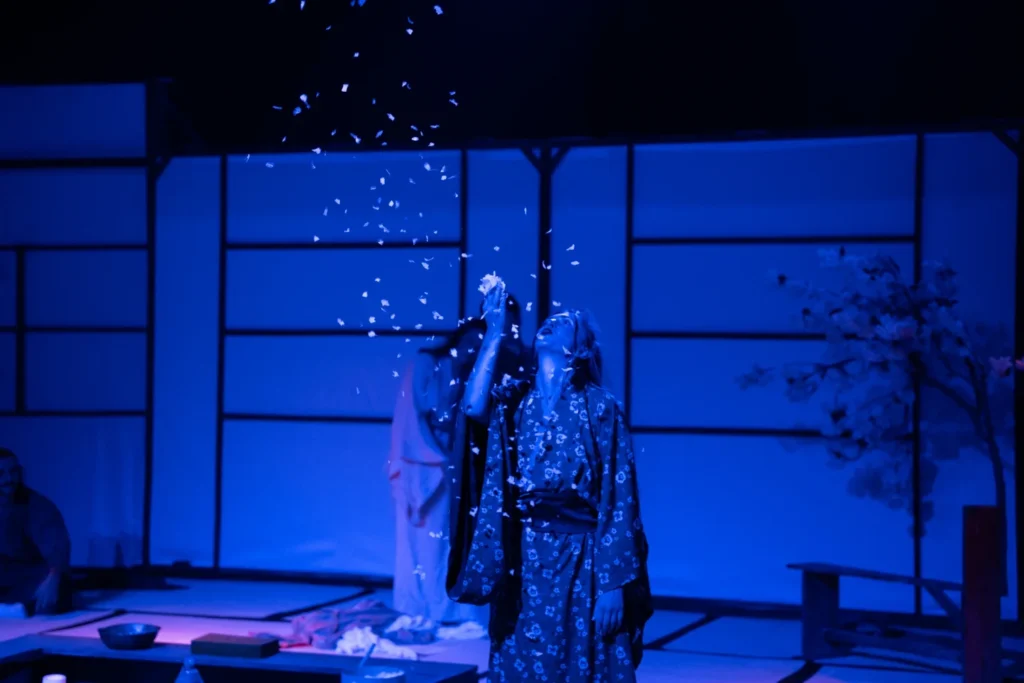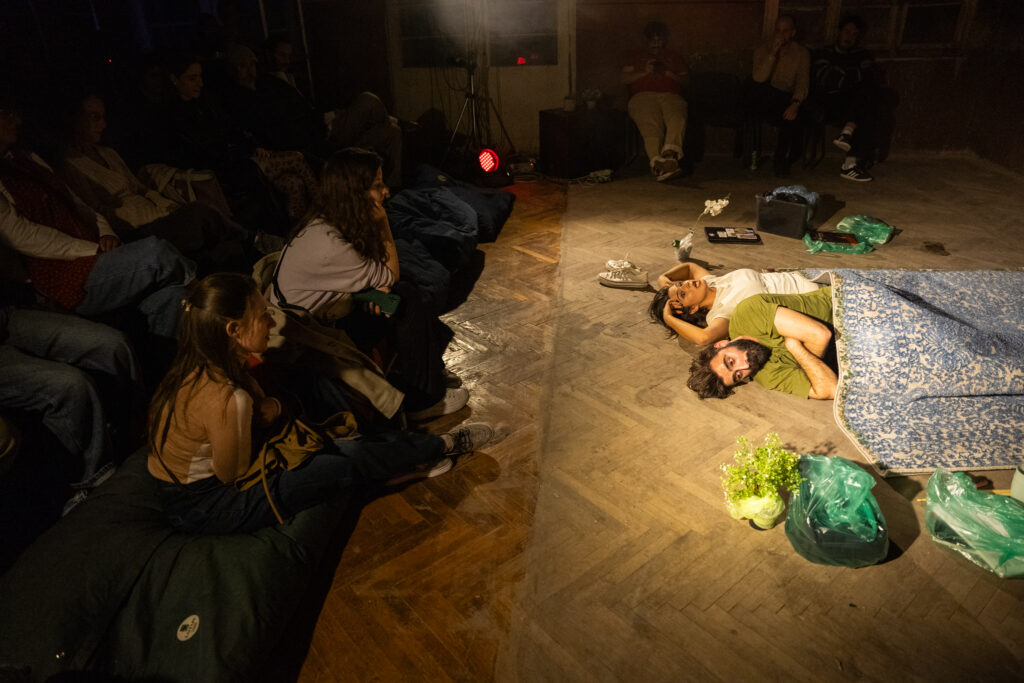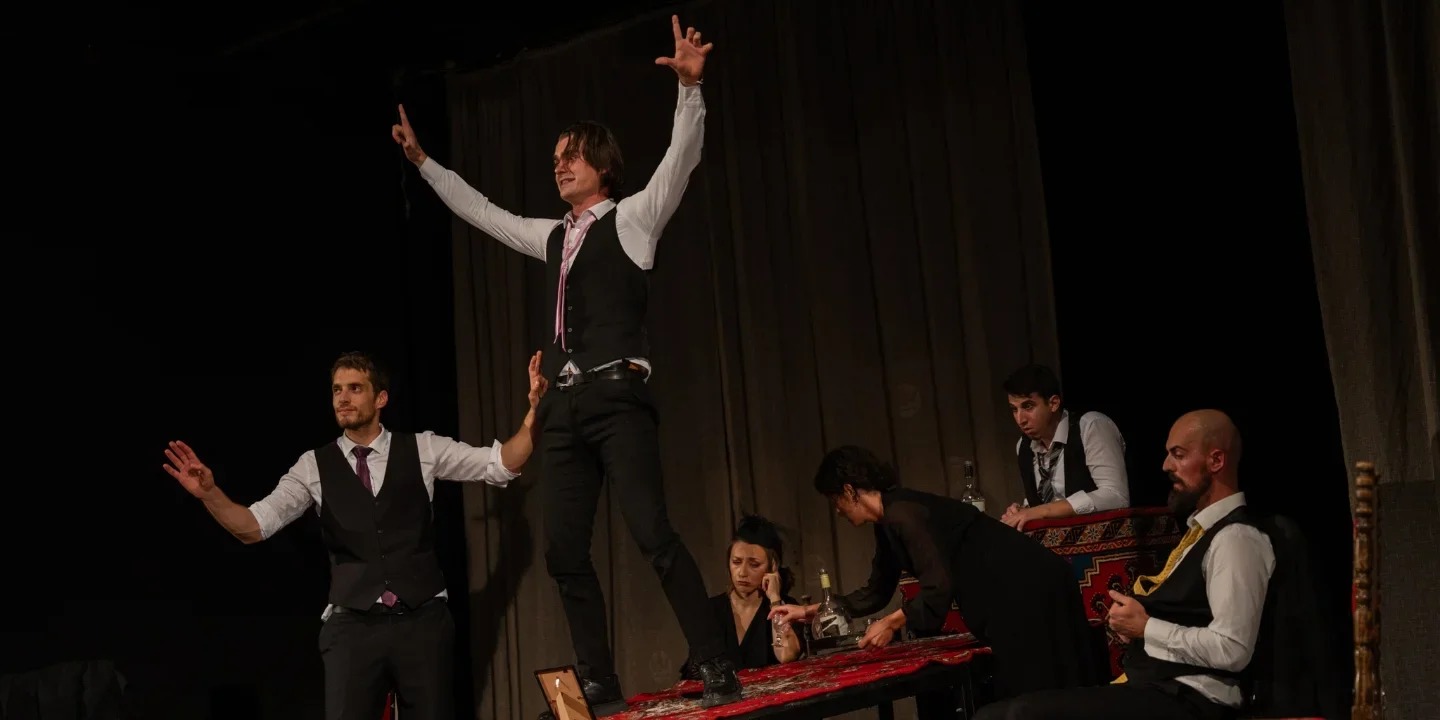The new Under 600 Showcase, which took place in Skopje in September, gathered together independent artists from across the region. Ana Ogrizović reports on some of the themes and highlights.
In times of political and financial uncertainty, art surpasses cultural impact and provides crucial drive. Theatre, in particular, carries a unique capacity to gather diverse voices, nurture dialogue and provide a safe space for expression.
Created by the united effort of Serbian Dah Theatre, Montenegran Korifej Theatre Kolašin and North Macedonia’s Schtrich troupe, the Under 600 showcase fully embodied that spirit and aimed to provide independent artists with a platform. Taking place in Skopje, between 25-28 of September, the event showcased a variety of performances from different countries in the region, providing young professionals with a space to challenge the divisions and difficulties of our times through the shared language of theatre.
The public was able to experience site-specific works in alternative spaces, interactive dramaturgy and topics ranging from personal identity struggles to broader political absurdities. The mission of Under 600 doesn’t end there: Another important part of this initiative is the creation and promotion of their digital platform, aiming to unite independent theatre professionals from the region and provide an easier way to connect.
The opening performance set the tone for the festival through a mixture of cultural appreciation and immersive participation. Snow, staged at MKC and directed by Zoja Buzalkovska, was an ambitious attempt to recreate an atmosphere inspired by Japanese aesthetics. Tatami-like mattresses structured the space, while music (David Angelevski) evoked the Orient. My favourite element of the scenography (Nenad Tonkin) was the centrepiece which resembled a zen garden, doubling as a tea ceremony setting.
Even before the show began, the actors moved slowly around the space, acknowledging the audience with a ritualistic calm and blurring the line between performers and spectators. The immersion deepened further when the audience was served tea in chawan bowls, directly participating in the ceremony. The titular snow was creatively brought to life by duvets and plastic foil, serving a symbolic substitution and reinforcing the dreamlike atmosphere. I loved the fact that the team had a Japanese culture and language consultant (Chie Nagashima), however I missed the act of writing or painting itself – given the fact that the protagonist is a young poet (portrayed by Marjan Naumov) in passionate pursuit of artistic expression. More significantly, the narrative treatment of women reduced their roles to extensions of male self-realization, an issue inherited from the source novel by Maxence Fermine. Nevertheless, the actors’ dedication spoke to the audience and conveyed the emotion of the fundamental human pursuit of pure art and deeper meaning. For me, the performance also highlighted the festival’s mission to communicate beyond linguistic divides.

Snow
Later that evening, the tone shifted from meditative to absurd. The Korifej Troupe from Montenegro introduced themselves with A Cross With a Five-Pointed Star (directed by Zoran Rakočević). The actors amplified the absurdity of the topic through expressive acting and exaggerated physicality. Scenography (Ivanka Vana Prelević) included chairs adorned with shoes and jackets, national ornaments, and most notably a marble table serving as a false tombstone. What began as potential drama evolved into a playful, absurdist reflection on banality and bureaucratic black comedy. Performances were strikingly diverse: from the daughter’s melodramatic cries to the doctor’s eccentric body language, all counterbalanced by the restrained subtlety of the grandson, which created a balance between humor and critique.
On September 26th, Promena Theater from Novi Sad presented an emotional and complex pondering of love. Performed at the Faculty of Dramatic Arts in Skopje and directed by Maša Pavlović, the two-hander As Long As We Speak of Love investigated stories of love, starting with Plato’s myth of soulmates and the idea that each human is doomed to spend their life searching for the other part to complete them. The staging oscillated between fourth-wall breaks and traditional delivery, moving from humour into raw emotion. Although the humour didn’t translate across linguistic borders every time, the final two stories left a deep impression, elevated by Ivan Petrušinski’s sincere portrayal of a young gay man’s struggle and Doroteja Vuković’s moving depiction of a woman who was mourning her fiancé. Audience involvement took the form of shared notes- written reflections from spectators in previous cities were read aloud, and new visitors were invited to contribute with their own definitions of love, creating a collective narrative in progress.
Performed in the eerie, worn-out Cinema at the Railway Station building, Who Knows Why? offered a contemplation of alienation and mental instability. Directed by Damjan Čitkušev and performed by Ane Blažovski , this performance combined motives from Dostoevsky’s classics with contemporary references.The use of live-streaming via iPhone added a modern, voyeuristic element, transforming the performance into something akin to a social-media broadcast of a breakdown. Audience members filmed fragments that were projected on the wall, blurring the lines between performance and surveillance. Childhood photographs deepened this unstable mix of reality and fiction, intensifying the emotional impact. The setting aditionally amplified the experience, evoking decay. Blažovski’s frightening smile and erratic shifts between humour and despair perfectly captured the paradox of being perceived as “funny” while wrestling with inner darkness and despair.
On September 27th, inside the cosy Kotur cafe, Angela Stojanovska presented a performance called Shame. She prepared her favourite cake while sharing personal reflections on body image, societal perceptions and her struggles as a plus-sized actress. Her reflections moved from food and personal struggles to professional frustrations and sibling comparisons, punctuated by childhood videos – the last time Stojanovska remembered feeling free of shame. By the end, the cake was completed and shared with the audience, completing the deeply emotional metaphor.

Good People
Later, the focus turned back to the Railway Station cinema, with a performance exploring the tumultuous love story of a young couple. Based on Duncan Macmillan’s play Lungs, inspired by The Relation Work Project by Marina Abramović and Ulay and directed by Tamara Stojanoska, Good People covered different stages of a romantic relationship: From moving in together and miscarriage to separation and eventual reconciliation, earnestly exploring the complexities of contemporary young adulthood. In this setting, the decaying space grew into representation of unstable housing and fragility. Humorous dialogue lightened the story’s darker moments, but the sincerity of the performers (Tijana Trajchevska and Filip Hristovski) carried the primary weight.
The festival’s most ambitious experiment came with The Conundrum of Revolution, produced by DAH Theater and directed by Dijana Milošević. The performance was staged across multiple buildings of the Faculty of Dramatic Arts and portrayed life stories and struggles of four prominent history figures. Spectators were divided into groups using coded slips of paper, moved between locations, and given props to create slogans or complete messages. The structure drew inspiration from absurdist and meta-theatrical traditions, while the movement between spaces and the demand for audience input created a collective momentum, forcing spectators out of their comfort zones and reminding that revolution cannot be a passive act. However, the story itself didn’t quite transcend the pamphlet-like style of political critique.
Overall, the first Under 600 successfully linked young professionals across the region and provided entertainment, as well as profound space for experimentation, artistic expression and dialogue. At a time when financial resources for culture are shrinking and political tensions tend to separate, this showcase confirmed that collaboration and communication is both possible and necessary in our region, because we are united by similar struggles.
Photos by:Ivo Velcevski and Jordan Zvezdoski
For more information, visit: Under 600 platform
Ana Ogrizović is a dramaturg and screenwriter from Serbia, recognised by multiple poetry, prose and playwriting competitions in the region. She is the author of two books, Let vremenske veštice (2024, Mladi Maj Award) and Ovde ne cvetaju bugenvilije (2023, Prvenac Award Edition). Her work has been translated into English and Italian.








